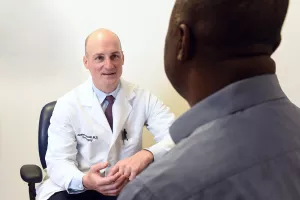Epilepsy is a brain condition that causes people to have seizures. At Tufts Medicine, we perform epilepsy surgery using the latest surgical techniques — like implantable devices to aid your brain's electrical signals or removing the seizure's origin — to help reduce your epileptic seizures or prevent them altogether.
Imagine a life free of seizures with epilepsy surgery
Even when you know the triggers for your epileptic seizures and are taking medications to control them, their physical and emotional effects can feel like a heavy weight to bear.
But the good news is we can help lighten that burden and keep epileptic seizures at bay with the latest neurosurgery procedures and technology, like the RNS® System by NeuroPace.

Conditions
Seizures linked to epilepsy happen when clusters of nerve cells (or neurons) in the brain send out signals that get crossed.
People on the verge of an epileptic seizure may have strange sensations and emotions or behave differently than normal. During a seizure, they may have violent muscle spasms or lose consciousness.
Testing
The people who would benefit most from epilepsy surgery experience seizures that always start in the same part of the brain. To create a map of your brain’s electrical activity and find out the source of your seizures, we’ll use 1 of 2 methods:
Noninvasive electroencephalography (EEG) monitoring: It involves placing small sensors, called electrodes, on your scalp, which detect and record the electrical signals produced by your brain.
Advanced diagnostic tools: In some cases, we need to place diagnostic tools on the surface of the brain (subdural strips and grids) or in the brain tissue (depth electrodes) to better understand your epileptic seizures. Our team has years of experience placing and removing these devices safely and effectively.
Treatments
Considering whether or not to have epilepsy surgery can bring on a wave of emotions. But our neurosurgery and neurology team will be there for you to help navigate these waters. We’ll take the time to explain your treatment options, the risks and benefits of epilepsy surgery and what to expect during recovery.
Removing the seizures’ origin
Sometimes, the most effective way to prevent seizures is by removing the source of the abnormal electrical activity. This is known as a temporal lobectomy, or a focal resection.
During these procedures, we remove a very small part of the brain — usually about the size of a quarter — to diminish seizure activity or even stop it altogether. This strategy provides freedom from seizures for about 60–80% of patients.
RNS System®
When medication isn’t helping you control your seizures, and removing the seizure’s origin isn’t safe or practical, we often recommend the RNS® System by NeuroPace. This device is like a small computer that a surgeon implants onto your brain. The RNS® System works by giving your nervous system greater control over the electrical signals it sends.
Vagus nerve stimulators (VNS)
A VNS is a small device that we implant near your neck. Think of it like a conductor in an orchestra, sending light electrical impulses through your vagus nerve to keep your nervous system on beat.

From regular office visits to inpatient stays, find the healthcare you need and deserve close to home.

Meet the doctors and care team devoted to supporting you every step of the way along your path to better health.